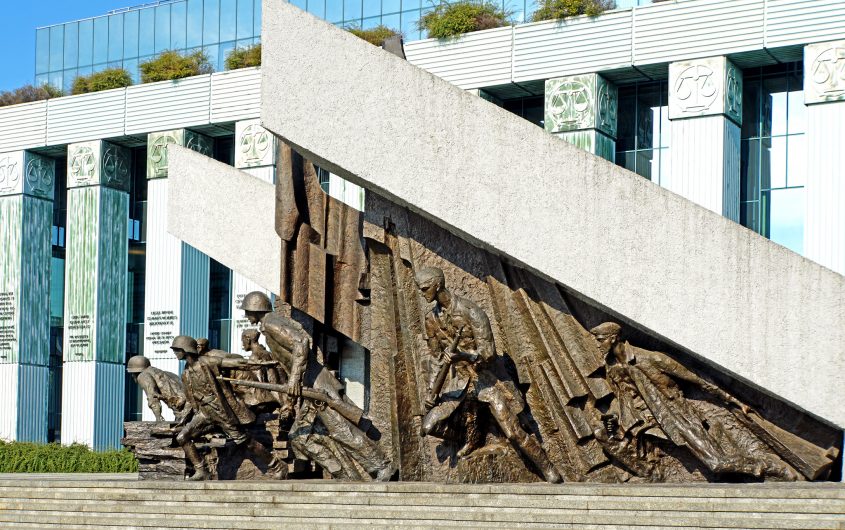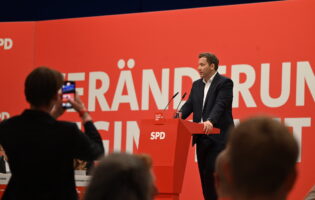
Dennis Jarvis via Flickr
Reparations Reprise

Molly O’Neal
Dr. Molly O’Neal is a former U.S. Foreign Service Officer whose career, from 1989 onward, was devoted to U.S. relations with Central and Eastern Europe, Russia, and Eurasia. After leaving the Foreign Service in 2006, she earned her PhD at Johns Hopkins School of Advanced International Studies (SAIS) in 2012, specializing in international political economy, comparative politics, American foreign policy, and European and Eurasian studies.
She has lectured and written on these subjects since 2010, most recently as a Fulbright professor and researcher at the Center for International Studies at the Technical University of Dresden through the spring and summer of 2022. In fall of 2019, she was a visiting researcher in the European department of the German Institute for International and Security Affairs (Stiftung Wissenschaft und Politik) in Berlin. She has taught international relations, American foreign policy, and European and Eurasian area studies at Baylor University, the University of Texas at Austin, and American University. She was a Fulbright Research Scholar and lecturer at Collegium Civitas in Warsaw in 2015-2016.
Her recent research and writing have focused on European politics, the European Union, and U.S. policy toward Europe and Eurasia.
Poland Presses a Perceived Advantage
The leader of Poland’s governing conservative Law and Justice (PiS) party, Jarosław Kaczyński, has escalated his demand for compensation from Germany for the World War II invasion and occupation of Poland. On September 1 (the anniversary of Germany’s 1939 invasion), Kaczyński released a final report of a five-year parliamentary study to assess the damages, injury, and loss of life from Germany’s invasion and occupation of Poland. The report assessed the damages at 1.3 trillion euros.
As happened when, in 2017, Kaczyński launched the reparations claim, the German Ministry of Foreign Affairs responded that the issue of reparations/compensation is and remains closed. On September 7, Chancellor Olaf Scholz reiterated this long-standing position. The German side points to the Polish government’s formal renunciation of further claims on Germany made in 1953. This renunciation was reinforced in the 1970 treaty normalizing Poland’s relations with West Germany. The German government contends that the ‘two-plus-four’ agreement of 1990 between the World War II allies and West and East Germany represents the final settlement of Germany’s World War II obligations. Moreover, as part of its accession to the European Union in 2004, the post-communist government of Poland formally accepted that no further reparations would be sought.
The Polish government has not yet communicated this more concrete reparations demand via a diplomatic note, nor has it indicated any specific legal process through which the issue might be adjudicated. Poland apparently seeks to persuade Germany to reconsider its previous rejection of any reopening of the reparations question and to open negotiations on these claims. Their appeal relies principally on the argument that a free Poland cannot be bound by agreements made by the former communist regime (PRL) since that regime was not genuinely independent. This argument by implication dismisses the validity of the undertakings of previous freely elected Polish governments which have confirmed the validity of the 1953 agreement.
Whether or not the demand for reparations has legal merit or moral force, it is undeniably also an instrument in the domestic political contest that pits PiS against liberal and left opposition in next year’s parliamentary elections.
Germany’s obligation to pay reparations to Poland has been a recurrent theme in Kaczynski’s self-proclaimed reassertion of Polish dignity and sovereignty since the party’s 2015 electoral victory. The logic of the populist/nationalist program of PiS is to repudiate the Europeanization of Poland by the liberal current of Polish party politics. Assimilating values and norms ‘taught’ by Western Europeans, once seen as a freely chosen process of modernization and as emphatically rejecting the era of Soviet tutelage is painted by PiS as the trading of one form of foreign domination for another. Whether or not the demand for reparations has legal merit or moral force, it is undeniably also an instrument in the domestic political contest that pits PiS against liberal and left opposition in next year’s parliamentary elections. Former Prime Minister Donald Tusk, leader of the opposition, accused PiS of pursuing an “anti-German campaign” to “rebuild support” for the ruling party. However, Tusk’s Civic Platform has suggested that, if elected, it would pursue dialogue with Germany to receive ‘compensation’ for World War II damages not previously redressed.
A stock in trade of the conservative leadership has been anti-German rhetoric and imagery and stigmatizing the liberal governing majority of Poland since the end of the Cold War as selling out Poland’s interests to Germany. This enmity spreads to the EU as a whole and is related to the prolonged legal battle with the European Commission over the PiS government’s judicial reforms, seen by the EU and confirmed by several decisions of the Court of Justice of the European Union to be in breach of rule of law standards on judicial independence.
Poland’s leadership perceives an opportunity to generate support within Europe to curb the reach and scope of EU obligations on member states, including on rule of law standards. In a broad sense, this can be interpreted as realist balancing against German influence in the EU. This is problematic since EU cohesion is an indispensable element of a future security order in Europe. So far, the EU has mainly withstood pressures to splinter against the resurgent threat from Russia’s invasion of Ukraine and the economic impacts affecting Germany, Poland, and Europe as a whole.
Poland seems to believe it has gained a new edge of credibility in strategic matters, having, along with the Baltics, correctly predicted the aggressive potential of Putin’s Russia.
Relations with Germany have been strained since PiS came to power. This arises in part from the belief on the part of Poland’s government that Germany stands behind the EU’s assertion of the rule of law norms which allow the Commission to justify withholding or reducing various highly substantial financial flows from the EU to Poland. This has already begun happening in the case of Hungary, whose defiance of EU norms Polish leaders had long emulated.
Relations with Germany have been further aggravated as Poland has decried Germany’s caution in supplying weapons to Ukraine. In a recent interview in Der Spiegel, Polish Prime Minister Mateusz Morawiecki scolded Germany for having underestimated the Russian threat to Ukraine. He said that Poland would set up a foundation to press Poland’s reparations demand and argued that the 1953 renunciation of reparations claims had been forced on Poland by the Soviets. He swung effortlessly from this argument to complaining that the EU was unfairly withholding the disbursement of 35 billion euros of COVID recovery funding based on unjustified objections to Poland’s judicial reforms. He alleged that the rule of law controversy was in fact a means used by Germany and France to suppress Poland’s leadership and prestige within the European Union.
Poland seems to believe it has gained a new edge of credibility in strategic matters, having, along with the Baltics, correctly predicted the aggressive potential of Putin’s Russia. Poland has eagerly helped Ukraine militarily and received the largest share of Ukrainian refugees. Germany’s policy of rapprochement with Russia has been exposed as naïve or worse and arguably diminishes Germany’s capacity to lead within the European Union. Poland is pressing its perceived advantage strenuously, in part because it turns the tables on Germany, seen heretofore as pressing the normative content of Europe’s integration project on Poland. Poland’s leaders may well believe that Germany’s new governing coalition will want and need to rebuild relations with Poland in light of the threat from Russia and might concede or give ground on the rule of law issue.









